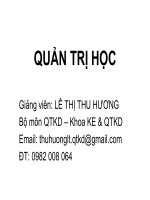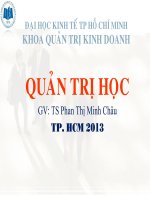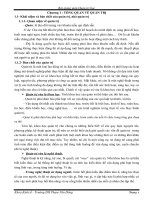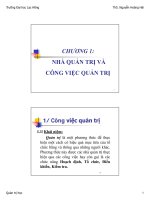Bài giảng môn Quản trị học Chương 10
Bạn đang xem bản rút gọn của tài liệu. Xem và tải ngay bản đầy đủ của tài liệu tại đây (917.89 KB, 30 trang )
10
Chapter
Understanding
Groups and
Managing
Work Teams
© Pearson Education Limited 2015
10-1
Learning Outcomes
• Define group and describe the stages of group
development.
• Describe the major concepts of group behavior.
• Discuss how groups are turned into effective
teams.
• Discuss contemporary issues in managing teams.
© Pearson Education Limited 2015
10-2
10.1
Define group and
describe the stages
of group
development.
© Pearson Education Limited 2015
10-3
What is a Group?
© Pearson Education Limited 2015
10-4
10.2
Describe the major
concepts of group
behavior.
© Pearson Education Limited 2015
10-5
Stages of Group Development
© Pearson Education Limited 2015
10-6
Group Effectiveness
Does a group become more effective as it
progresses through the first four stages?
© Pearson Education Limited 2015
10-7
Group Behavior
© Pearson Education Limited 2015
10-8
Norms
© Pearson Education Limited 2015
10-9
Conformity
© Pearson Education Limited 2015
10-10
Status Systems
Status
A prestige grading, position, or rank within a
group.
© Pearson Education Limited 2015
10-11
Group Size and Group Behavior
© Pearson Education Limited 2015
10-12
Group Cohesiveness
© Pearson Education Limited 2015
10-13
10.3
Discuss how
groups are turned
into effective teams.
© Pearson Education Limited 2015
10-14
Groups Versus Teams
© Pearson Education Limited 2015
10-15
Types of Work Teams
1.
2.
3.
4.
Problem solving teams
Self-managed work teams
Cross-functional teams
Virtual teams
© Pearson Education Limited 2015
10-16
Virtual Teams
A type of work team that uses technology to
link physically dispersed members in order to
achieve a common goal.
© Pearson Education Limited 2015
10-17
Effective Teams
© Pearson Education Limited 2015
10-18
Team Composition
© Pearson Education Limited 2015
10-19
Team Member Roles
© Pearson Education Limited 2015
10-20
Work Design
Key work design elements:
1. Autonomy
2. Using a variety of skills
3. Completing a whole and identifiable task
4. Impact of task/project on others
© Pearson Education Limited 2015
10-21
Team Processes
Variables related to effectiveness:
1. Common plan/purpose
2. Specific goals
3. Team efficacy
4. Task conflict
5. Minimal social loafing
© Pearson Education Limited 2015
10-22
Shaping Team Behavior
• Member selection is key
• Teamwork training
© Pearson Education Limited 2015
10-23
Rewards
External rewards:
• Promotions
• Pay raises
• Other forms of
recognition
Inherent rewards:
•Camaraderie
•Personal development
•Helping teammates
© Pearson Education Limited 2015
10-24
10.4
Discuss
contemporary
issues in managing
teams.
© Pearson Education Limited 2015
10-25









